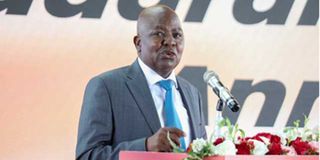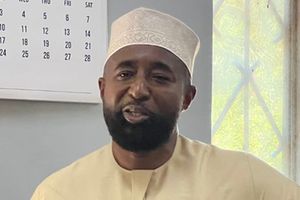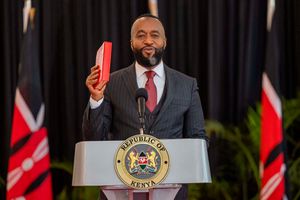
Mombasa businessman Abubakar Ali Joho haks cited Kenya Railways Corporation MD Philip Mainga (inset) in a defamation probe.
The Managing Director of Kenya Railways Corporation (KRC) has been mentioned in a defamation case in which Mombasa businessman Abubakar Ali Joho, alias Abu, claims that a document maligning him is linked to his business rival, tycoon Mohammad Jaffer.
Mr Philip Mainga is said to have informed Mr Abu about the existence of a defamatory document circulating on social media, which allegedly targeted him and his brother, Cabinet Secretary for Mining and Blue Economy Hassan Joho.
Police Constable Fredrick Muchiri told the court that although Mr Mainga informed Mr Abu of the document, he did not conduct a forensic examination of his phone to confirm whether the call or message had been made.
“The information we received is that it was Mr Mainga who notified Mr Abu of the defamatory document. However, I have not examined his phone to verify the communication,” Mr Muchiri said during cross-examination by Defence Counsel Michael Oloo last Friday.

Kenya Railways Corporation Managing Director Philip Mainga at Nairobi Terminus on Tuesday, June 10, 2025 during the 8th anniversary celebration of the Madaraka Express.
Despite this, Mr Muchiri maintained that Mr Mainga was not the author of the document, pointing instead to the accused, Matilda Maodo Kinzani, as the source and author of the letter in question. He added that he did not record a statement from the KRC boss as a witness in the case.
This revelation followed a query by Mr Oloo about the possibility of the letter being wrongly attributed to his client.
“It is not possible that Mr Mainga authored the letter because forensic analysis traced it to Ms Kinzani’s phone. I reviewed the forensic report, which links the document to the accused, although the lead investigator will elaborate further,” the officer told Mombasa Senior Resident Magistrate David Odhiambo.
Guided by State Counsel Barbara Sombo, Mr Muchiri said he was instructed to assist in the investigation after Mr Abu filed a formal complaint with the Directorate of Criminal Investigations (DCI). He personally delivered the contentious letter to Nairobi for forensic analysis.
“A preliminary report confirmed that the accused authored the letter. Officers identified her as an employee of Bulkstream and proceeded accordingly,” he said.
Ms Kinzani faces four criminal charges under Section 23 of the Computer Misuse and Cybercrimes Act for allegedly disseminating false and defamatory information online. She is accused of falsely claiming in a WhatsApp group that Mr Abu and his brother CS Joho defrauded Mombasa County of more than Sh40 billion.
According to the charge sheet, she also circulated a message titled “To the Government of Kenya and the Gen Z,” in which she falsely accused Mr Abu of drug trafficking and of illegally acquiring land belonging to Kenya Railways in Mombasa, claims that the prosecution says were aimed at damaging his reputation.
However, in a twist, the court heard that Mr Abu did not name Mr Jaffer in the initial complaint he filed at Central Police Station.
“I reviewed the statement and Mr Jaffer’s name is not mentioned. I was not present when Mr Abu filed the complaint,” Mr Muchiri admitted during cross-examination by Mr Oloo.
Mr Muchiri appeared to agree with the defence’s suggestion that the inclusion of Mr Jaffer’s name later in court could be seen as an afterthought.
In a previous court session, Mr Abu blamed the smear campaign against him and his family on his entry into the port logistics business an area he claims Mr Jaffer had dominated for decades. He testified that his entry into the logistics sector disrupting a 30-year monopoly by Mr Jaffer triggered a sustained online campaign against him and his family.
Mr Abu, who owns Autoport Freight Terminus and Portside Freight Terminal, directly named Mr Jaffer—the owner of Bulkstream Ltd (formerly Grainbulk Handlers Limited) as the alleged source of the attacks.
“He has had a monopoly for 30 years. Now that I have entered the port business, that’s where our troubles began. He is the monopoly; I am not,” said Mr Abu.
The businessman said he learned of Mr Jaffer’s alleged involvement after investigations linked Ms Kinzani, an employee and personal assistant of Mr Jaffer, to the defamatory letter.
However, Mr Muchiri reiterated that Jaffer’s name did not appear in the initial complaint that prompted the investigation.
Mr Muchiri, an officer with the Anti-Terror Police Unit (ATPU) faced tough questions about why a cybercrime case was being handled by his unit instead of the designated cybercrime division. He maintained that as a police officer, he is authorised to investigate any case but acknowledged that he was acting on instructions from his superiors.
“I am aware I should only act within my mandate and not follow instructions that contravene the law. I am an investigator; the law gives me the authority to investigate all cases but I act as assigned,” he said while responding to Mr Oloo.
He told the court that while he was trained under the Anti-Terrorism Act and admitted the matter fell under the cybercrime law, the ATPU had not overstepped its mandate.
“We were not investigating Ms Kinzani for terrorism. This publication did not constitute a terrorist threat,” he clarified, rejecting claims that the ATPU misused its powers in the case.
He also revealed that seven ATPU officers participated in the raid of Ms Kinzani’s home and workplace at Bulkstream during which her electronic devices were seized as part of the probe.
In a surprising admission, Mr Muchiri said his handwritten statement was missing from the court file and that the typed version provided to both the prosecution and defence contained a typographical error.
“The statement in the file is typed, but it’s not signed by me. I wrote and submitted it to the investigating officer, but it’s missing. I don’t know why,” he said.
He confirmed that officers secured a search warrant from the magistrate’s court before raiding Ms Kinzani’s home and office. The seized devices were later returned to her after undergoing forensic analysis in Nairobi.
“I did not know the accused before the investigation. I came to know her after the forensic report identified her as the author,” he said.
Mr Muchiri admitted that he did not know the exact motive behind the defamatory publication only that it was seen online and linked to the accused.







